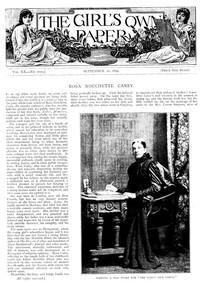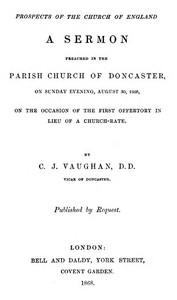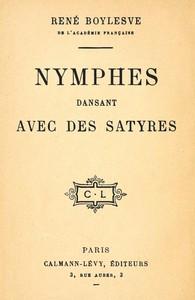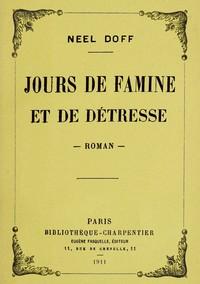Read this ebook for free! No credit card needed, absolutely nothing to pay.
Words: 25400 in 10 pages
This is an ebook sharing website. You can read the uploaded ebooks for free here. No credit cards needed, nothing to pay. If you want to own a digital copy of the ebook, or want to read offline with your favorite ebook-reader, then you can choose to buy and download the ebook.


: The Girl's Own Paper Vol. XX No. 1029 September 16 1899 by Various - Children's literature Periodicals
The youngest girl but one of a family of seven, and in her girlhood delicate in health, which caused her education to be somewhat desultory, Rosa Carey soon displayed an aptitude for composing fiction and little plays which she and her sister acted, one of her chief amusements being to select favourite characters from history and from fiction, and trying to personify them, while her greatest pleasure was to relate short stories to this same younger sister over their needlework. It is a strange fact that, during her simple, happy, uneventful girlhood, chiefly spent in reading, in writing poetry, and in other girlish occupations, Rosa Carey, who was of a somewhat dreamy and romantic disposition, feeling the impossibility of combining her favourite pursuits with a useful domestic life, and discouraged by her failures in this respect, made a deliberate and, as it afterwards proved, a fruitless attempt to quench her longing to write. This unnatural repression, however, of a strong instinct could not be conquered, and after some years she yielded to it.
She was born in London, near old Bow Church, but has no very distinct remembrances of the house and place. Later, the family moved to Hackney, into what was then a veritable country residence, and there many happy years were spent. Her mother was a strict disciplinarian, and very practical and clever, while her father was a man universally beloved and respected, by reason of his singularly amiable character, his integrity, and his many virtues.
Meanwhile, the large and happy family was being gradually broken up. First the beloved father passed away. On the same day that, three years before, had witnessed his death, their mother, too, was taken to her rest, and shortly after, the two sisters went to Croydon, to superintend their widowed brother's home. Miss Carey's real vocation in life seemed to spring up, and the literary work was but fitfully carried on, for, on the marriage of her sister to the Rev. Canon Simpson, vicar of Kirkby Stephen, Westmoreland, and the subsequent death of her brother, the sole charge of the young orphans devolved upon her.
As the years rolled by, circumstances tended to break up that home also. The young people grew up and scattered, and out of Miss Carey's four charges three are now married. Then, her pleasurable duties being accomplished, the partially disused pen was resumed, and the author found leisure to return to literary pursuits. She has for the last twelve years made her home in the ancient and historic village of Putney, which, although it has lost much of its quaint and picturesque environment since the destruction of the toll-house and the old bridge of 1729, with its twenty narrow openings--erstwhile the delight of artists--has yet a few "bits" left that have escaped the hands of the Philistines.
While never exactly forming plots, when Miss Carey is about to begin a story, she thinks of one character, and works around that, meditating well the while over the others to be introduced. Then she starts writing, and soon gets so completely to live in and with her creations, that she feels a sense of loss and blank when the book is coming to an end, and while she has to wait until another grows in her mind. But, after all, her writing--the real work of her life--has often to be made a secondary consideration, for in her strong sense of family duty and devotion, and being the pivot round which its many members turn in sorrow or in sickness, the most important professional work is apt to be laid aside if she can do aught to comfort or to relieve them.
Nor have her sympathies been exclusively limited to her own people. Ever fond of girls, and keenly interested in their welfare, Miss Carey conducted for many years a weekly class that had been formed in connection with the Fulham Sunday School for young girls and servants over fifteen years of age, many of whom have had good reason to remember with gratitude the kindly encouragement and the wise counsel bestowed upon them by the gentle and sympathetic author, Rosa Nouchette Carey.
HELEN C. BLACK.
VARIETIES.
MANSIONS.
"I am glad that His house hath mansions, For I shall be tired at first, And I'm glad He hath bread and water of life, For I shall be hungry and thirst. I am glad that the house is His, not mine, For He will be in it, and near, To take from me the grief I have brought, And to wipe away every tear."
DEATH THE GATE OF LIFE.--Plato, the great Athenian philosopher, who was born 427 years before Christ, recognised the doctrine that death is but the gate of life. "My body," he says, "must descend to the place ordained, but my soul will not descend. Being a thing immortal it will ascend on high, where it will enter a heavenly abode. Death does not differ at all from life."
USELESS TROUBLE.
Free books android app tbrJar TBR JAR Read Free books online gutenberg
More posts by @FreeBooks

: Prospects of the Church of England A sermon preached in the Parish Church of Doncaster on Sunday evening August 30 1868 on the occasion of the first offertory in lieu of a church-rate by Vaughan C J Charles John - Church of England Sermons; Sermons Englis


: Nymphes dansant avec des satyres by Boylesve Ren - Short stories French; French fiction 20th century






